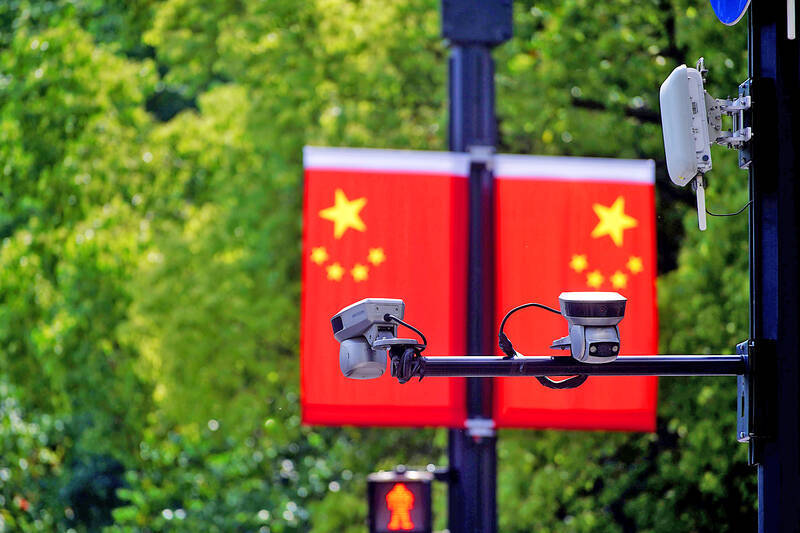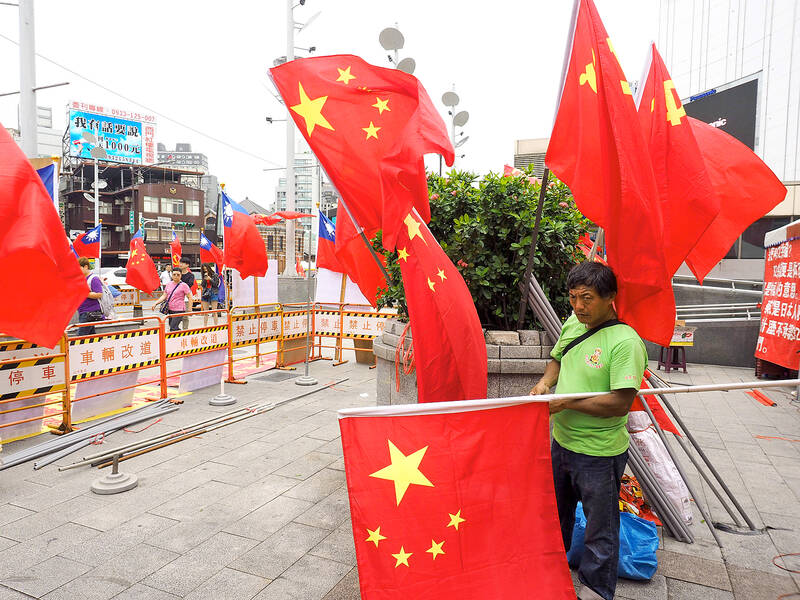People should avoid unnecessary travel to China after Beijing issued 22 guidelines allowing its courts to try in absentia and sentence to death “Taiwan independence separatists,” the Mainland Affairs Council (MAC) said yesterday as it raised its travel alert for China, including Hong Kong and Macau, to “orange.”
The guidelines published last week “severely threaten the personal safety of Taiwanese traveling to China, Hong Kong and Macau,” MAC Deputy Minister and spokesman Liang Wen-chieh (梁文傑) told a news conference in Taipei.
“Following a comprehensive assessment, the government considers it necessary to elevate the travel alert to orange from yellow,” Liang said.

Photo: Reuters
Beijing has implemented or amended national security laws for mainland China, and enforced new national security laws in Hong Kong and Macau, he said.
“We have been urging Beijing to avoid creating barriers that would impede cross-strait exchanges. Unfortunately, Beijing continues to implement measures that damage cross-strait relations and has been doing so with intensifying efforts,” he said. “The guidelines it issued on June 21 would only increase the personal safety risks of Taiwanese traveling in China.”
If a trip is necessary, people should avoid discussing sensitive political issues; taking pictures of seaports, airports and military facilities; and carrying books on politics, history or religion while there, Liang said.

Photo: David Chang, EPA-EFE
The council on its Web site has a list of behaviors that could potentially cause Taiwanese to contravene national security laws while they are in China, Hong Kong or Macau, he said, adding that they should read them and register their travel plans with the council before departing.
The Ministry of Transportation and Communications in a statement said that it respects the council’s decision.
“Our position that cross-strait tourism exchanges should proceed in a healthy, progressive and orderly manner remains unchanged,” the ministry said.
The travel alert is a recommendation to travel agencies and the public, who can decide for themselves whether they should proceed, the ministry said.
Tour cancelations should be handled based on standardized contracts between travel agencies and their customers, the ministry said, adding that disputes could be arbitrated by the Travel Quality Assurance Association.
As some tours were formed before the government reintroduced a group tour ban for China, Minister of Transportation and Communications Li Meng-yen (李孟諺) asked the Tourism Administration to closely monitor the status of tour groups in China, and remind people to assess the risks and beware of their safety, the ministry said.
The travel alert to China was “red” during the COVID-19 pandemic and was downgraded to “yellow” in October 2022 when the pandemic eased, Liang said.
The government was planning to further downgrade the alert to “gray” in July last year, but maintained the “yellow” alert after Beijing proposed an amendment to an anti-espionage law and implemented a new National Security Law in Hong Kong.
“The government has an obligation to remind people that there are indeed risks traveling to China following the announcement of guidelines to punish ‘separatists,’” Liang said. “We cannot ignore the situation and pretend as if nothing happened, or we would be accused of being negligent.”
The travel advisory is neither a mandatory rule nor a retaliatory measure against Beijing’s anti-separatist guidelines, he said.
The US in July last year elevated its travel alert to China and Macau to Level 3 after Beijing implemented amendments to its Foreign Relations Law and Anti-Espionage Law.
In April, the US travel alert was extended to cover Hong Kong, Liang said.
The Level 3 alert says that people should reconsider travel to China, Hong Kong and Macau “due to arbitrary enforcement of local laws” and “risks of local detention.”
Concern for the safety of Taiwanese traveling in China is not unfounded, Liang said.
Gusa Press (八旗文化) editor-in-chief Li Yanhe (李延賀), better known by his pen name, Fucha (富察), is under investigation for alleged infringement of the “Anti-Secession” Law, as is Taiwanese National Party cofounder Yang Chih-yuan (楊智淵), Liang said.
“It is possible that none of them would imagine they would be arrested and detained for breaching the ‘Anti-Secession’ Law,” he said. “The point is that they were arrested because of what they did outside of China, not what they did in China.”
The council has also received reports about retired Taiwanese police and military personnel being interrogated and detained upon arrival, he said.
China has extradition agreements with about 60 countries, with most of them stating that no political prisoners would be extradited, Liang said, adding that extradition would only occur if a person is found guilty in both countries.
“We think none of the developed countries would extradite Taiwanese to be tried in China, but some countries might still comply with their agreements with China,” he said.

A Ministry of Foreign Affairs official yesterday said that a delegation that visited China for an APEC meeting did not receive any kind of treatment that downgraded Taiwan’s sovereignty. Department of International Organizations Director-General Jonathan Sun (孫儉元) said that he and a group of ministry officials visited Shenzhen, China, to attend the APEC Informal Senior Officials’ Meeting last month. The trip went “smoothly and safely” for all Taiwanese delegates, as the Chinese side arranged the trip in accordance with long-standing practices, Sun said at the ministry’s weekly briefing. The Taiwanese group did not encounter any political suppression, he said. Sun made the remarks when

The Taiwanese passport ranked 33rd in a global listing of passports by convenience this month, rising three places from last month’s ranking, but matching its position in January last year. The Henley Passport Index, an international ranking of passports by the number of designations its holder can travel to without a visa, showed that the Taiwan passport enables holders to travel to 139 countries and territories without a visa. Singapore’s passport was ranked the most powerful with visa-free access to 192 destinations out of 227, according to the index published on Tuesday by UK-based migration investment consultancy firm Henley and Partners. Japan’s and

BROAD AGREEMENT: The two are nearing a trade deal to reduce Taiwan’s tariff to 15% and a commitment for TSMC to build five more fabs, a ‘New York Times’ report said Taiwan and the US have reached a broad consensus on a trade deal, the Executive Yuan’s Office of Trade Negotiations said yesterday, after a report said that Washington is set to reduce Taiwan’s tariff rate to 15 percent. The New York Times on Monday reported that the two nations are nearing a trade deal to reduce Taiwan’s tariff rate to 15 percent and commit Taiwan Semiconductor Manufacturing Co (TSMC, 台積電) to building at least five more facilities in the US. “The agreement, which has been under negotiation for months, is being legally scrubbed and could be announced this month,” the paper said,

MIXED SOURCING: While Taiwan is expanding domestic production, it also sources munitions overseas, as some, like M855 rounds, are cheaper than locally made ones Taiwan and the US plan to jointly produce 155mm artillery shells, as the munition is in high demand due to the Ukraine-Russia war and should be useful in Taiwan’s self-defense, Armaments Bureau Director-General Lieutenant General Lin Wen-hsiang (林文祥) told lawmakers in Taipei yesterday. Lin was responding to questions about Taiwan’s partnership with allies in producing munitions at a meeting of the legislature’s Foreign Affairs and National Defense Committee. Given the intense demand for 155mm artillery shells in Ukraine’s defense against the Russian invasion, and in light of Taiwan’s own defensive needs, Taipei and Washington plan to jointly produce 155mm shells, said Lin,